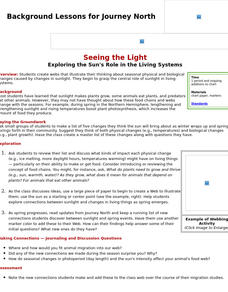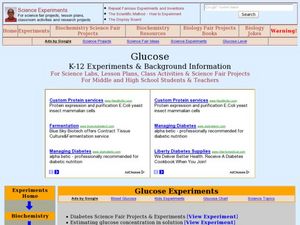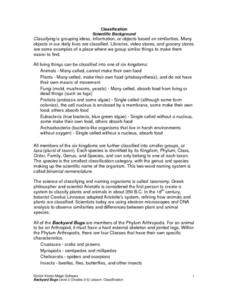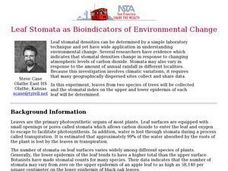Curated OER
Plant Structure, Function and Growth
Students study three structures of a plant as well as their locations and functions. In this botany lesson students complete several activities on plant organs and their functions.
Curated OER
Science: Leaf Study
First graders go on a leaf-hunting expedition around the schoolyard. They determine from which trees they fell using identification cards. Students read several books about leaves and apply their artistic skills by using the collected...
Curated OER
Milkweed Monitoring
Ninth graders study milkweed and see how it is effected by ozone. In this air pollution lesson students complete a lab activity that includes data analysis.
Curated OER
Plant Identification Pictionary
Learners examine ecosystems and the variety of plants and animals that can be found in them. In this plant identification lesson students identify the basic parts of a plant and categorize them according to their characteristics.
Curated OER
Where Do Plants Get Their Food?
Young scholars think about the historical development of the scientific method. They design an experiment that replicates van Helmont's, using only specified materials. Pupils then improved upon van Helmont's procedure and also...
Curated OER
Soil Nutrients - Phosphorus Lab Lesson Plan
Students list sources of phosphorus in soil. They explain how phosphorus is removed from the soil and used by plants. Students list the symptoms of insufficient or excess phosphorus. Students perform experiments to examine the effect of...
Curated OER
Where Do Green Plants Get Energy?
Fourth graders realize that plants need light, water, and carbon dioxide to carry out photosynthesis. They participate in groups of 4 to plant (with materials provided) a test group of beans to compare to the control group, write a...
Curated OER
SAV Plants of the St. Mary¿¿¿s River Ecosystem
Students examine the importance of submerged aquatic vegetation in the St. Mary River ecosystem. They identify different characteristics of common eelgrass and discuss water quality, photosynthesis, habitat, oxygen production.
Curated OER
Exploring the Sun's Role in Living Systems
Students create graphic organizer webs that illustrate their thinking about seasonal physical and biological changes caused by changes in sunlight. They identify the central role of sunlight in living systems.
Curated OER
Space Salad
Students identify and analyze some of the similarities between Earth and Mars. Students identify why scientists believe that living things such as plants can live on Mars. Students evaluate each of the Growing Space modules identify in...
Curated OER
How Much Water Does A Tree Transpire In A Day
Young scholars engage in a instructional activity of investigating the amount of water that is transpired in a one day cycle. They conduct research to find the purpose of transpiration and find information to explain the value to a plant...
Curated OER
Food Chains
Young scholars create their own food chains on Kidspiration starting from the energy of the sun and what it creates. In this food chains lesson plan, students learn about how insects eat plants and so on.
Curated OER
Mycorrhiza
Students examine the symbiotic relationship between fungus and plants. For this ecosystem lesson students complete several mycorrhiza experiments.
Curated OER
Glucose
High schoolers conduct various experiments on glucose. For this biology lesson, students differentiate the process of diffusion and osmosis. They test different foods for the presence of glucose and starch.
Curated OER
Producers and Consumers
Students make lists of producers and consumers and act as consumers that eat producers in a garden. In this producers and consumers lesson plan, students demonstrate a food chain by using a piece of yarn to connect all of them together.
Curated OER
Weather Lesson 1
Students describe and compare the layers of the atmosphere. They explain how to measure the temperature of the atmosphere. They also explain what causes the atmosphere to heat up in some places more than in others.
Curated OER
Backyard Bugs
Explore the concept of scientific classification and the similarities and differences between plant and animal species. Your class will participate in hands-on activities by investigating dichotomous keys and classifying their shoes. To...
Curated OER
Food Webs
Students create a bulletin board display illustrating food chains they make from a list of ocean organisms. Students also play a game showing what happens when one of the organisms is removed from the food chain and how they are all...
Curated OER
Science: What Is the Carbon Cycle?
Students examine the carbon cycle while identifying its sources, sinks, and release agents. Using magazines and newspapers, groups of students design collages illustrating the carbon cycle. Finally, they write responses to several...
Curated OER
Cell-ebrations in Science
Students recognize that all living things are made up of cell and that they cannot easily be seen by the naked eye. Students become familiar with the use of microscopes as a tool for investigation.
Curated OER
This Can't be a Plant
Students grow mold. In this science experiment lesson plan, students grow mold on different pieces of bread by adjusting the moisture, temperature, and light. They record the results to see which grows the most mold.
Curated OER
Thin Layer Chromatography (TLC) Separation of Plant Pigments - Chlorophyll, Carotene
Students use TLC separations to identify various substances. For this chlorophyll lesson students separate pigments found in different plants.
Curated OER
Leaf Stomata as Bioindicators of Environmental Change
Students, in this experiment, collect leaves from two species of trees and the stomatal index on the upper and lower epidermis of each leaf be determined.
Curated OER
Leaf Stomata as Bioindicators of Environmental Change
Learners perform an experiment to determine the stomaltal index on the upper and lower epidermis of two species of leaves. Stomatal densities change in response to changing atmospheric levels of carbon dioxide and to annual rainfall.

























